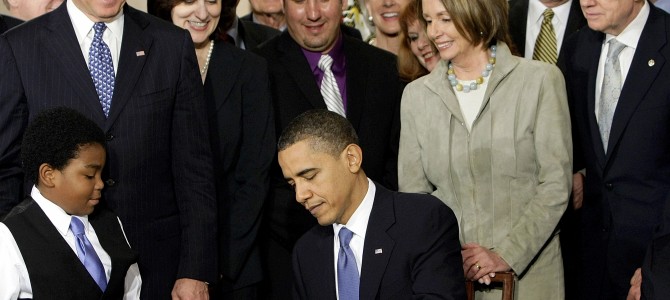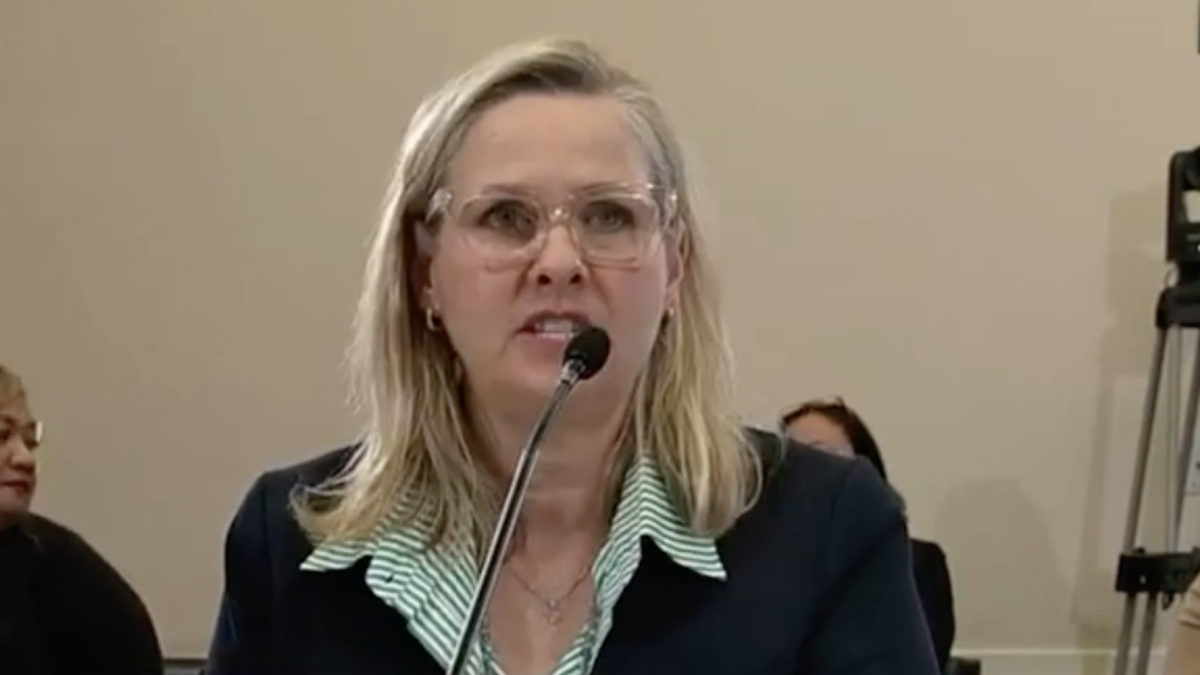
More than four years after the president signed his signature health care initiative, the Affordable Care Act, into law, many states are still struggling to navigate it. A key issue still facing states is whether to expand Medicaid and increase the pool of residents eligible to join the program. Here are 12 reasons why states where the jury is still out should give Obamacare’s Medicaid expansion two thumbs down.
1. Medicaid doesn’t actually improve health outcomes.
According to an extensive, randomized study of people who enrolled in Oregon’s 2008 Medicaid lottery, Medicaid doesn’t improve the health outcomes of its patients, even after controlling for major health predictors like income and pre-existing health status. The researchers tracked the health progress of people who were admitted into the program and who people who applied but did not get selected by the lottery. According to the researchers, one of whom helped craft Obamacare, while the program led to people using more health services, those services didn’t actually make them physically healthier:
This randomized, controlled study showed that Medicaid coverage generated no significant improvements in measured physical health outcomes in the first 2 years.
2. Medicaid promises people health coverage, but often denies them access to quality doctors.
Too often the current Medicaid program denies patients access to care, since about 40 percent of primary care doctors do not even accept Medicaid patients because the reimbursements are so low. As a result, studies show that patients on Medicaid often have worse outcomes after major surgeries, have higher child mortality rates, and use emergency rooms even more than people without insurance. Medicaid proves the truism that access to a government program is not necessarily access to quality health care.
3. Expanding Medicaid without reform accepts a broken status quo that fails patients and taxpayers.
Expanding Medicaid without serious reforms perpetuates a broken status quo. Expanding the broken program papers over structural flaws which we all know. Even President Obama himself acknowledged in June of 2009, before he signed Obamacare into law, that Medicaid is broken:
As we move forward on health care reform, it is not sufficient for us simply to add more people to Medicare or Medicaid, to increase the rolls, to increase coverage in the absence of cost controls and reform. And let me repeat this principle: If we don’t get control over costs, then it is going to be very difficult for us to expand coverage. These two things have to go hand in hand. Another way of putting it is, we can’t simply put more people into a broken system that doesn’t work.
And yet today, forcing more and more people into a “broken system” is exactly what Obamacare’s Medicaid expansion does. Rather than reforming the program, Obama enlarged it. There’s no need for governors and state legislatures to jump into that pool just because it’s a little bit bigger now.
4. Obamacare’s expansion is a one-size-fits-all, all-or-nothing approach.
The White House’s one-size-fits-all, must-be-138-percent-of-the-federal-poverty-limit-or-lower, all-or-nothing approach minimizes the common-sense design improvements and program integrity changes most governors support. Health solutions for populations in large, urban areas like New York City won’t necessarily match those for populations in sparsely populated rural areas. State lawmakers deserve the freedom to design solutions that work best for the people that live in their states. Rather than forcing a single solution down the throats of 50 very different states, the White House should give state lawmakers the flexibility they need to design programs that fit the unique needs of their residents.
5. Medicaid expansion could increase the cost of private health care.
Many hospitals and health care providers shift their costs of treating Medicaid patients to those with private health insurance. This is because health providers are paid less per Medicaid patient treated than they are generally paid per privately insured patient (many hospitals lose money treating Medicaid patients). To make ends meet, hospitals will often charge higher rates from private insurance plans in order to make up the difference. As a result, expanding Medicaid could actually make quality private health care less affordable.
6. Medicaid expansion crowds out other private health care options.
One of the architects of Obamacare, Jonathan Gruber (who also coauthored that Oregon Medicaid study), estimates that Medicaid expansions can reduce private coverage by 60 percent. A RAND study also found that of 60 percent of Medicaid expansion is just replacing coverage that people already had.
Given that Medicaid has been shown to have no positive effect on physical health outcomes, it makes no sense to give people an incentive to shift from quality private health coverage to sub-standard government coverage. Medicaid was created to give low-income families access to quality care—it was never meant to be a replacement for private coverage of people who can afford it.
7. Obamacare’s Medicaid expansion is financed with $1 trillion in tax hikes and $700 billion in cuts to Medicare.
Contrary to politicians like Ohio Gov.John Kasich, who claimed that money would be “left on the table” if Ohio refused to expand Medicaid, there is no pot of money sitting around just waiting to be used. Obamacare’s Medicaid expansion is paid for through a combination of tax increases and cuts to Medicare. The program doesn’t work like a typical discretionary program, where a fixed amount is appropriated regardless of program utilization. Medicaid’s cost increases are tied directly to enrollment. When more people join the program, it costs more. The only money “left on the table” is money that belongs to the already over-taxed families who are busy trying to cope with the massive health insurance premium increases Obamacare has foisted upon the country.
8. It’s unrealistic to think the projected level of Medicaid spending under Obamacare’s expansion can be sustained.
The Congressional Budget Office (CBO) projects federal Medicaid costs will DOUBLE over the next 10 years. Congress already spends more each year than it receives, and there is also a concern with the sustainability of the funding for the Medicaid expansion. It is unrealistic to expect the federal government to continue to pay 90 percent of the costs of care for able-bodied adults. On the current spending path, CBO already projects that the federal budget will return annual budget deficits in excess of $1 trillion. Over the next 10 years, CBO projects the Medicaid program will cost federal taxpayers $4.2 trillion. The current fiscal trajectory is simply unsustainable without drastic cuts, dangerously high debts, or painful tax increases.
9. Uncle Sam can unilaterally change the terms of the deal whenever he feels like it…
Just because the federal government provides a certain percentage of Medicaid funding per state right now doesn’t mean that percentage will stay constant over time. The formula used to calculate the federal share of per state Medicaid funding is known as FMAP, or Federal Medical Assistance Percentage. Some states get a lot, and some states get very little. Quite often, a state’s FMAP is dependent upon whether that state has a particularly powerful lawmaker in Congress. Sen. Ted Stevens of Alaska was famous for trying to sneak FMAP increases for Alaska into unrelated legislation.
As Medicaid costs increase, thereby increasing the federal budget deficit, politicians will begin to look for ways to shift the costs over to the states. Obama even hinted at that possibility in his 2013 budget, when he proposed a “blended” FMAP formula that had the effect of slowly reducing the federal government’s share of Medicaid expenses over time. Long story short: Just because the federal government promises a certain matching percentage today doesn’t mean that percentage will still be around tomorrow.
10. Expanding Medicaid could force states to reduce funding for education, increase state tuition, or cut transportation funding.
Today, Medicaid consumes about one in four dollars of an average state’s budget. Even with the president’s non-binding promise of Uncle Sam paying for much of the expansion under the president’s health care law, non-partisan experts agree that Medicaid expansion will increase costs to states. Experts warn these increased costs will threaten other important state budget priorities like spending on education, roads and bridges, and state prisons. As the Medicare actuary warned, “Should these trends continue as projected…Medicaid’s share of both Federal and State budgets would continue to expand absent other changes to the program, budget expenditures, or budget revenues.”
11. Expanding Medicaid could force states to increase taxes.
As Medicaid costs balloon, states could avoid those massive programmatic cuts to non-Medicaid programs, but the solution wouldn’t be any better: States could always raise taxes. If state and local politicians decided that cuts to other programs were too much to bear, they could turn instead to the geese that keep on laying golden eggs: hard-working taxpayers. Or they could do both, and cut programs and raise taxes to pay for the Medicaid expansion.
12. Obamacare repeal becomes harder and harder as more people pile into Medicaid.
This is likely one of the few areas of agreement between Obamacare’s boosters and its opponents. It’s one reason why the president has pushed governors and state legislatures to adopt Medicaid expansion. As the Medicare rolls increase, so, too, do the number of people who could lose coverage under a vanilla Obamacare repeal. “Why do you want to steal health insurance away from these low-income families?” the Left will ask, full of faux outrage.
There’s an easy solution for conservatives, though: Just don’t expand Medicaid. It’s that simple. The program costs too much, does far too little, and creates way too many political pitfalls down the road. Both politically and policy-wise, the best option for conservative state lawmakers is to just say no.









